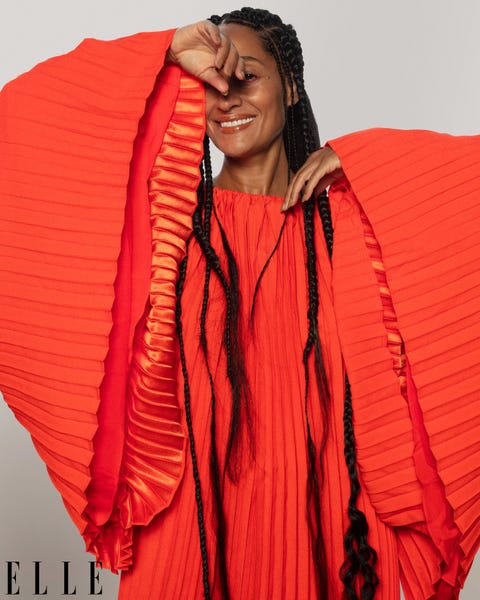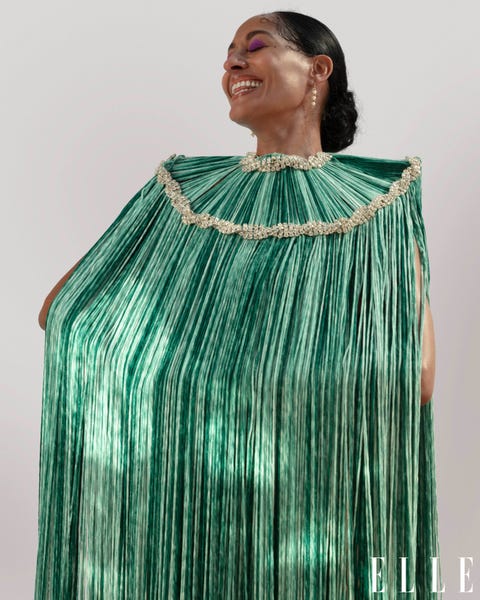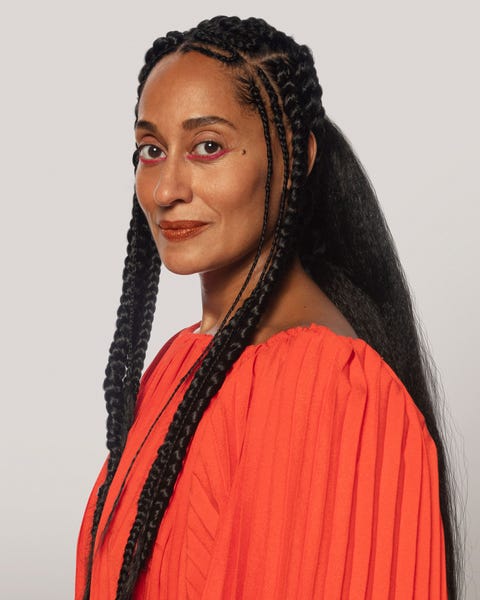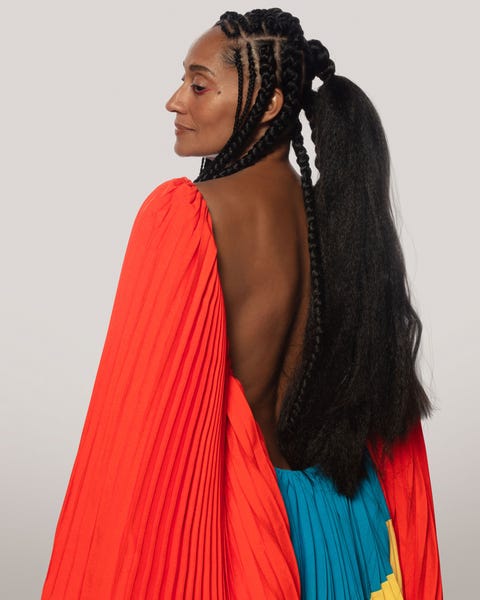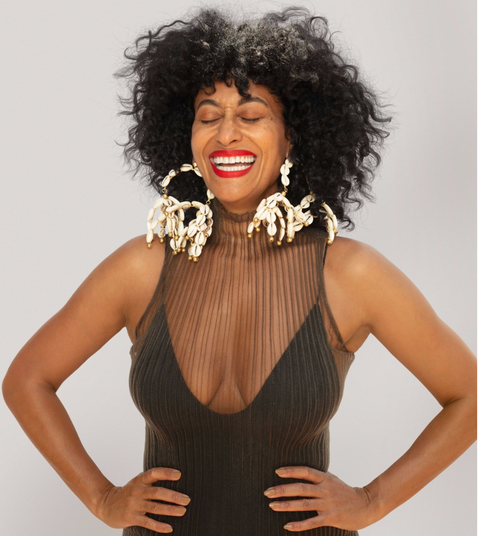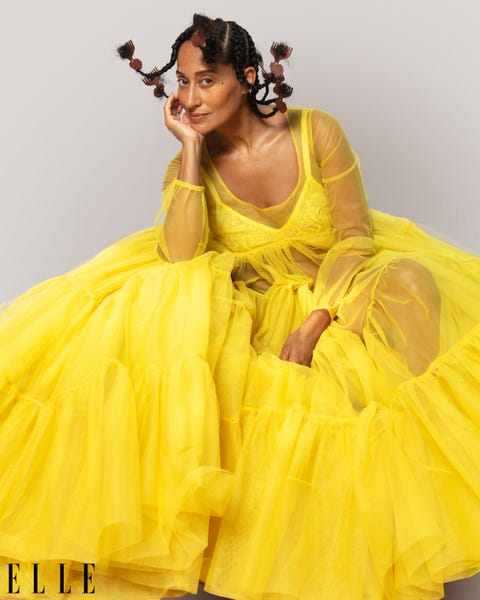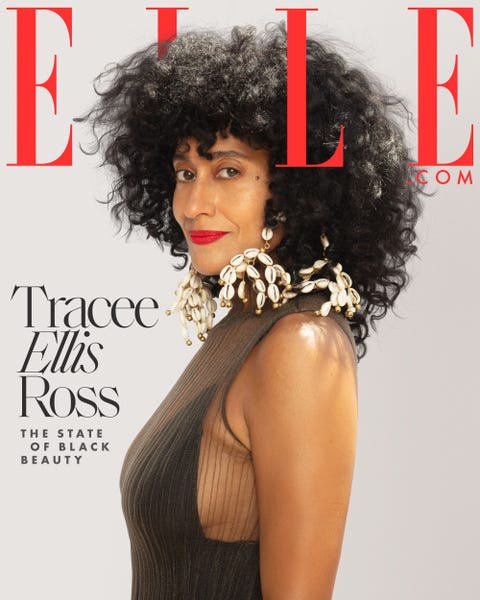It’s been less than a year since Tracee Ellis Ross officially launched her Pattern Beauty line. And in that short period of time, the woman who you first fell for on Girlfriends and now adore as network TV’s best mom on Black-ish has settled into what is perhaps the defining role of her lifetime: Black beauty entrepreneur and advocate.
Being a Black Hollywood icon comes with a sense of responsibility—a single hairstyle choice has the power to shift public perception and personal narratives. No one understands that better than Kerry Washington. For ELLE.com’s inaugural State of Black Beauty cover story (and just days before their back-to-back nights hosting the Democratic National Convention), Ross connected with her friend and fellow Emmy nominee via Zoom to discuss how they show up for Black women and each other.
Kerry Washington: I was just texting you on one of our threads. We have so much to talk about [Laughs].
Tracee Ellis Ross: I know. I have a lot of things I need to update you on and I’m sure you have some for me!
KW: Yes, yes, but I want to start talking about you and this incredible journey with your company. It’s born out of your own journey with your hair and you’ve now given so many of us a better toolbox to be able to be on that journey with you. I want to know when the idea to birth Pattern came to be. How did that happen?
TER: It started as such a personal relationship with my own hair, and feeling like I didn’t have the support to find what I needed. Not just in terms of products, but in terms of how to love myself. I was very supported in my family around my hair. But in terms of seeing all different kinds of versions in the wallpaper of my lives out in the world, I wasn’t seeing it. And I was getting confused. All of the things that I was taught from the media were like, I was supposed to have easy breezy beautiful hair. Bouncin’ and behavin’. My hair didn’t blow in the wind! All of these things didn’t match up.
I was a track runner. So I was sweating out my hair all the time. And I swam. So there were all these things that were occurring for me personally, and I discovered that there were so many other people who were experiencing the same disconnect. There was a void, in both seeing ourselves in our natural, authentic beauty, and also having products that would work for us to do our hair naturally—to wear it the way it naturally came out of our heads. It was after Girlfriends that I wrote my first haircare brand pitch. And it was not received the way I thought it would be received [Laughs].
KW: What do you mean?
TER: Right before Girlfriends ended…I used to shop at all the beauty supply shops that were on Wilshire and one of the stylists was like, “You don’t know the amount of people that come in here with a picture of you pulled out of a magazine and they want your hair. If you were to do a line of products, you’d be a millionaire.” I was like, “What? My hair?” And, you know, there was no social media at the time so there was no connection between the community and me.
Then I went to an event for Curly Nikki, who was one of the original natural hair care bloggers and there was a line of women around the block, all wearing their hair naturally. It was the first time I saw the larger community. That’s what started to give me this idea. But the journey was a slow one. Our beauty was not a part of the standard or culture of beauty. There was no real frame to hold.
You and I have been listening to Kimberlé Crenshaw, and this expression that she uses has been so helpful for me: If there’s no frame to hold the facts, it’s very difficult to hold the facts. There was no real frame for the beauty that existed. It took about ten years to create Pattern. The mission is two-fold, to create effective products for the curly, coily, and tight textured community. The second part of the mission is to be an active space to celebrate Blackness and the power of Black beauty.
KW: I mean, I can’t think of a better person to be having this conversation with.
TER: The importance for me in the journey has been encouraging, inspiring, and making space for people to go on that journey with themselves. To have the courage to dive into their own legacy of hair as a way to love themselves and be revolutionary.
KW: This self-acceptance feels so core, right? The self-love that comes from self-acceptance, not, “I have to transform into something other than who I am to be beautiful, but just as I am, I am beautiful.” But that’s hard.
TER: It’s so hard. It’s a painstaking daily journey. You and I—I want to backtrack just to give us a little context for the world. There’s an assumption that all the Black actresses know each other. The truth is, we do. [Laughs]
KW: We do. [Laughs] Most of us do.
TER: Most of us. But we have had a really long-lasting friendship that started early in our careers. We share so many intersections. Our lives cross over in so many different, unique, very sacred, and intimate ways, all while being Black actresses. You have shown up for me in my life in so many ways. Remember when I was hosting the NAACP Awards?
KW: I do.
TER: I was hosting with the cast of Girlfriends. I was really nervous, and Kerry came just to be in the audience so that there was a face I could look out at—somebody I knew was rooting for me and supporting me. That’s at the core of my relationship with beauty. It’s about like-minded, like-heartedness, and women who are willing to let their lives be about being of service to something bigger than just their egos. There’s a lot of beauty in that.
KW: Sometimes we can feel like speaking up on our own behalf looks like ego. But asking for what we need—whether it’s a friend at an awards show, or speaking up in the hair and makeup trailer, or in our relationships—it is a part of how we express our work, not necessarily our ego. How do you navigate that?
TER: With a lot of support. It takes a lot of courage to advocate for yourself. As a woman, and as a Black woman, advocating for yourself is actually a form of resistance. It is how each of us push the world to make sure that the real estate matches the reality of who we are and what we deserve.
KW: [Snaps fingers] Preach and poetry! It’s true. To be part of a marginalized population, as women, as people of color, as both, just the act of saying “See me, hear me, don’t push me to the side, just value my presence here in the center of this moment,” is terrifying but necessary.
TER: And every courageous act that a marginalized person takes opens up a space for somebody else.
KW: It’s for community.
TER: It is. I like to use the acronym for ego of Edging God Out. Often, if you look at it from that perspective, then speaking up for yourself is being of service to the god within you. It is you stepping up and saying, “I deserve something better.”
I have issues sometimes with the word “empower,” like, “We’re going to empower you.” Because often, for so many marginalized people, yes, they don’t have power on the outside, but they do have that power in the inside. The system is mirroring back a powerlessness. That’s not the truth, but we so often believe in the system—because how could you not?—and you think that’s the truth.
KW: People always say, “Oh, she gives voice to the voiceless.” It’s like, nobody’s voiceless. Everybody has a voice, it’s just, are we listening?
TER: One of the things I’ve been thinking about is what good leadership is. It’s really about listening and creating space for those who continue to reimagine. Bringing forward that idea of shared leadership, as opposed to the patriarchal idea of one leader who does it all. I was going to ask you, when it comes to using your voice, what does it take for you? I always find it helpful to hear the different ways that people experience similar things because it gives you other options in life. Often the experience of being a marginalized person, of being a woman, of being a person of color, we are siloed off.
KW: Yes.
TER: That is one of the ways that the system keeps you powerless. The system says, you’re alone in this, it’s only you. The more that you link arms and realize the fellowship that occurs in the same feelings, the more power you have. It’s the same thing with the storytelling of the experience. The more I hear other people’s narratives and how they’ve navigated through, I go, “Oh, that’s an idea that I could use.”
KW: In our industry, and in a lot of industries, we’re not just siloed, we’re also told these myths about one another: “That one over there, she’s difficult,” or, “That one, she’s crazy.” And that too is a weapon used to keep us from linking arms and creating community and shared power. I love the idea of sharing narratives of how we navigate. I feel like that is what we do all the time.
TER: [Laughs]
KW: So speaking up for myself: One is, if I’m not sure how much ego I’m grappling with, I try to talk it out with somebody. And journal about it to get a sense of how much am I operating out of fear in this moment: Is my fear rational? Is it based on real dynamics at play, or am I telling myself stories about unknown situations just to fill in the story with fear that I know? So journaling or talking to friends really helps. I’m finding that the more I speak up for myself, I have remember it. To write down that it went well. Because I’m trying to rewrite the myth that it’s something I’m not allowed to do. So I have to acknowledge it, go back to that same friend, and say, “It went okay. Help me remember that that went okay so that I can rewire myself to know that speaking out for myself is loving and positive and leads to good results.”
TER: Yeah. Within that is also this idea that I had to let go of, which is that sometimes when I’m doing good it doesn’t always feel good. And that’s not an indication that I’m doing something wrong. Also, when things are going slower than I expect, I think I’ve done something wrong. Not true. I use a lot of the tools that you just suggested. I don’t journal as much, because it seems that the life is real busy [Laughs]. I may do a mental journaling, but getting that paper out…Don’t get me wrong, it’s right here! [Holds up notebook and pen, laughing] But…
KW: For me, it’s a tangible thing. If I’m on my phone, my kids don’t care. But if I have a journal and a pen, I’m like, “Mommy’s busy! Mommy’s doing something! Don’t you see I’m doing something! I’m writing things!” [Laughs].
TER: Amazing. Yeah. The other piece that has been the most liberating is knowing the difference between discomfort and an actual problem.
KW: Yes. Just because I’m uncomfortable doesn’t mean that anything is wrong. Sometimes when I’m uncomfortable, it’s the pain of growth.
TER: Mm-hmm. There’s another acronym—Awareness, Acceptance, Action. Sometimes I can have an awareness and I want to jump to the action. I want to be like, “All right, we’re going to fix this. I’m not going to feel this way anymore. Done, done, done, done, done.” It’s about allowing that space between the awareness that something is making me uncomfortable, possibly in pain, and then sitting with it for a second to actually reason it out. To get in there and go, What is making me uncomfortable? Is this something I need to speak up about? Who’s the person to speak up to? Who can support me in this moment? Do I need to check out other resources to have an informed response that is not necessarily an emotional response? And then, from there, how do I decide to take an action? One of the things I’ve learned, particularly around advocating for myself, is that the more that I personally feel informed, and it’s not just, “I feel”—which there’s nothing with, because feelings are very important, they are my guide—but like, this is what’s happening. How do I effectively advocate for myself so that I have the best chance of getting my needs met or of being heard?
KW: Yeah, how do you incorporate this thinking and living in the world as a leader within your company?
TER: I bristled when you said “leader.” I was like, “Okay Kerry, settle down there buddy!”
KW: But you are! You are. It’s your company.
TER: Yeah, it is. A lot of it is baked into the foundation of the company: The fact that we support organizations that have like-minded missions around supporting women and people of color. The fact that I like to experience shared power around our table, everybody’s point of view is welcome and wanted. People bringing their whole selves to work is really important to me. There’s room for people’s humanity, including my own. The company started as personal and mine but it’s not just mine anymore. It belongs to those people who purchase the products. It belongs to all of us who built it, and continue building it. I don’t have children, but I birthed this. And so, there’s an element of shepherding it, and also getting out of the way.
KW: I want you to know, it’s just become such a part of our lives. I was in my son’s room, getting them dressed, and I said to my six year-old, “Can you go into Mommy’s cabinet and get the cream for the hair—it’s an orangey-yellow with the black writing.” And she was like, “The Pattern?” And I was like, “Yeah. The Pattern. Could you get the Pattern Styling Cream please?”
TER: Oh that makes my heart so full. That’s so good.
KW: Part of what happens when you are in the public eye is that your personal journey becomes cultural, right? As we grapple with our relationship with our hair, people witness that process on a larger stage. I’m really grateful that we, actresses and hair stylists and artists, have all been revealing more of our authentic, natural beauty. That we’ve made those choices on red carpets and on covers and TV shows. When I see you do it, it makes me want to do it more. Whether it’s protective styles, or curly styles, or whatever it is—the more that we make room for ourselves, we make room for each other. And that, in turn, reverberates out into community. It’s a dialogue, too. We see street style filled with self-love, and we say, “Yes. I want to bring that to a red carpet.” The cycle just continues of us encouraging and uplifting each other to just be ourselves.
TER: It reverberates back for each of us. You making space for yourself allows me to make space for myself. I think back to 10 years ago, I went to the Essence Music Festival and a woman was like, “Girl, you’re on TV. You need to get your hair done.” And I was like, “What do you mean?” She was like, “Put some heat on your hair! What are you doing?” Growing up, we all went through this experience, where straight hair was your dressed-up hair. The blowout, silky-whatever meant you became more presentable, more appropriate. It was your dressy, sexy version of you. I see such an evolution on that narrative and I’m so grateful for it. I’ve had days, particularly during the pandemic, but even two years ago, where I looked at the news and I’m like, “Oh my god.” You’re never used to see natural texture on a news anchor. There’s been a real shift. And bringing the circle back to Dr. Crenshaw and this idea of the frame—I realize that Black girls have been magic forever, but once we got this term, the world was able to see that magic in a way it wasn’t being received before.
From Girlfriends until now, what I see out in the world gives me courage to be myself. Seeing the way Solange wears her hair, I’m like, “So beautiful. This is so beautiful.” Back in the day, Black girls on TV who were wearing their hair in its natural texture were like five. Rae Dawn Chong was the first one I ever saw. My mom, yes, but Rae Dawn Chong, then there was Lisa Bonet, Cree Summer, Lisa Nicole Carson, that’s all I saw. So seeing the exploration—I mean, every time we’re on a Zoom, I’m like, “Kerry, your hair is so gorgeous.”
KW: My favorite thing? [Holds up Pattern product.]
TER: I say it every time, even if we’re on with other people. I’m like, “Hold on everybody. Do you see the coils?” I have a real love of texture. Those with tighter textures have given me the courage to embrace and love what grows out of my head. I always remind people, we’ve been here doing this forever. This is not some new phenomenon. Braids are not new. Cornrows are not new. Twists are not new. Bantu knots are not new. If our hair could talk, it would tell you of our legacy. Black beauty is timeless and holds such a story that I am so grateful to be a part of, and to continue allowing it to unfold through me. Black women and our hair have been at the center of social, cultural, political, and economic revolutions and movements through time. We hold so much power in our beauty. Our beauty is filled with love and joy and an emotional intelligence that reaches into spaces that allow us to connect with each other in such sacred ways.
KW: I love that. I’m grateful that we’re in a space of connecting. It used to be that we had to heat-treat the hair to feel beautiful. Not that I don’t love a little heat on my hair occasionally. But there seems to be an increased connection between Black health and Black beauty. We are understanding the health of our hair is from moisture, and treating our hair with loving kindness, treating our skin with more loving kindness with butters and creams that are rooted in moisture and in clarity and cleansing. It’s less about covering and more about revealing who we are and committing to health and wellness so that when we reveal ourselves, it is the best version of ourselves. That, I think, is exciting for me because it speaks to us as a community caring for ourselves. That our beauty is coming not from a denial, or a covering or a hiding, but from a nurturing of who we really are.
TER: Yeah, our power is not at the expense of ourselves.
KW: Yes. That’s right.
TER: They actually can be one and the same. When we care for ourselves and love on ourselves, we get to be included in the process of our beauty. We get to be incorporated into, and folded into our power.
KW: Yeah.
TER: It’s really beautiful. I’m grateful for an organized time to look at each other, because we’re about to get on the text.
KW: Exactly.
TER: Thank you Kerry. Love you.
KW: Love you more.
Styled by Shiona Turini; Hair by Araxi Lindsey; Makeup by Tracee Ellis Ross; Nails by Maho Tanaka.

